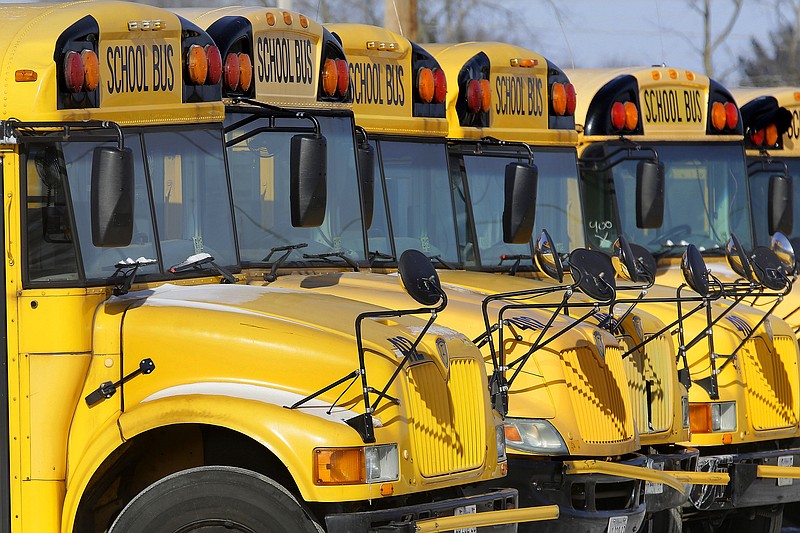The School Board for the Pulaski County Special School District decided Tuesday to ask voters in a Nov. 2 election to approve a restructuring of district debt as a way to raise $80 million that will be used in part for building expansions at Mills, Robinson and Maumelle high schools and at Baker Elementary.
The $80 million finance and building plan was adopted 5-0 at a meeting in which the board also approved: A mask mandate for students and employees that will be reevaluated in 60 days.
A covid-vaccination incentive of $200 to each employee who is fully vaccinated.
Up to 10 days of employee covid-19 sick leave and an offer to pay teachers at the end of the school year for the covid-19 sick leave days they do not use at the daily rate of substitute teacher pay, which is $87.
A motion authorizing the superintendent to negotiate the district’s purchase of Sylvan Hills High School football field enhancements that were initially purchased by the Sylvan Hills Bears Foundation with a bank loan of $1 million — more than $711,000 is now unpaid by the foundation.
The refinancing of a 2017 bond issue at a lower interest rate of 2.79% to generate about $7.6 million in interest savings over eight years to go toward the construction of track and field facilities at Maumelle High.
Also Tuesday, School Board member Alicia Gillen of Maumelle announced that she was resigning from the seat she has held since 2016. Gillen recommended that Lindsey Gustafson of Maumelle be appointed to replace her. Gustafson, an attorney, previously chaired the district Citizens Advisory Council when the district was under state control and without an elected school board.
The newly approved Nov. 2 ballot proposal to raise $80 million for new projects includes the Mills University Studies High School plan announced in July for a 2,200-seat arena, 10 new classrooms and a softball field.
The district had announced a $19 million Mills High plan in response to a federal court order to “square up” Mills with Robinson Middle School that was built and opened at the same time in 2018 but has been judged to be superior in quality.
The district has been obligated by the terms of its federal court-approved desegregation plan to equalize the condition of its school buildings. A federal judge in May ruled that the district had met its desegregation obligations in other areas of its operations — leaving the district to make Mills, in a less-affluent and with a relatively higher percentage of Black residents, comparable to Robinson, which is in the more affluent west Pulaski County.
In addition to the work at Mills, district leaders are calling for new bond money to be used for: Robinson High School expansion to accommodate 1,500 students, $35 million.
Maumelle indoor practice facilities/softball — baseball fields, $11 million Baker Elementary to accommodate 700 students, $5 million Harris and College Station elementary schools modernization, $6 million A new Northwest Transportation School Bus Pound, $4 million Lighting upgrades, $2 million Sylvan Hills High School band room, $1 million Technology and ventilation systems, $1 million if funds are available after other work done.
The projects call for refinancing existing bonds and issuing new bonds for new facilities to take advantage of what would otherwise be a $10 million-a-year drop in the district’s debt payments in the 2030s.
Jack Truemper of Stephens Inc, the district’s financial adviser, said the district has three previously approved bond issues, from 2012, 2016 and 2017, that are to be paid off by 2035. He recommended restructuring those bonds and issuing new bonds — extending the debt payments on them to 2048, which is what the district’s existing 14.8-debt service mills are set to expire.
There would be smaller debt service payments on the new bonds in the years up to 2035 and then when the earlier bonds are paid off by 2035, the larger debt service payments on the new bonds would kick in.
“What we are in essence doing is leveling out your payments,” Truemper said.
The plan would not result in a tax increase for property owners in the district, he said, nor does it call for extending the 14.8-debt service mills of the overall 40.7 mill rate beyond the current 2048 expiration rate.
“It provides the district with a way to generate project funds for various projects and not change the millage rate at all for the patrons of the Pulaski County Special School District,” he said. “I would call it a restructuring and extension of those three bond issues — extending their maturity out to the 2048 maturity level where the patrons have approved your debt service mills.” Gillen said that the funding plan is a rare opportunity to improve facilities without a tax increase in a district that once was under state control for fiscal distress but is now financially solvent and under the governance of an elected school board.
Curtis Johnson, the district executive director of operations, told the board that district leaders have fought for the past three years to be declared unitary by the federal court and released from court oversight of its facilities.
“This initiative will help us get to where we need to be with a equity,” Johnson said about the building plan.
Board members voting for the plan were Gillen, Linda Remele, Stephen Delaney, Tina Ward and Shelby Thomas. Board members Brian Maune and Eli Keller were absent.
